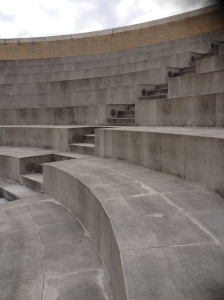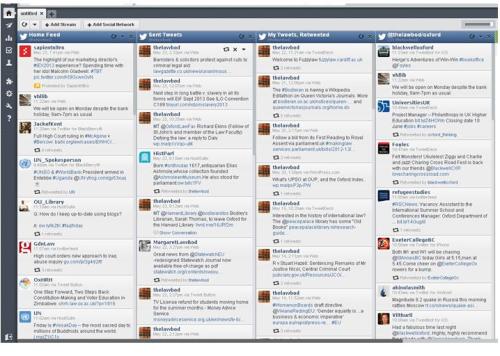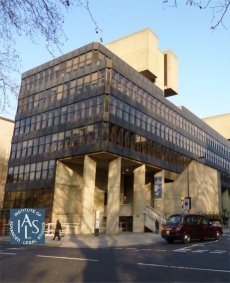Hullo! My name’s Will, and I’m the graduate trainee at the Codrington Library at All Souls College. I graduated from Merton College, Oxford in 2009 with a degree in English, and then studied for a Masters degree at the same College before starting at All Souls. Since no single day is entirely representative of my experience at work (variety being one of the main attractions of working in a college library), this little diary is a bit of a chimera, with lots of different events from my usual working week unceremoniously lumped together. Still, I hope it will sketch out some of the things you might encounter as a trainee at an Oxford College. Here goes…
8:45am – Arrive at the Codrington. Say hullo to Betty (our library scout). Open office. Switch on lights. Sigh. Put on kettle.
9:00am – Check the Fellows’ borrowing register (latterly an impressive leather-bound tome, currently an orange exercise book, soon to be an impressive leather-bound tome again). I add any new withdrawals to the relevant spread sheet, and update the book with today’s date.
9:25am – A mysterious parcel has arrived overnight. Excitement builds. It contains law textbooks and periodicals. Excitement fades.
9:30am – Open exterior door to Readers. Switch on recess lighting in the Great Library and the law reading room.
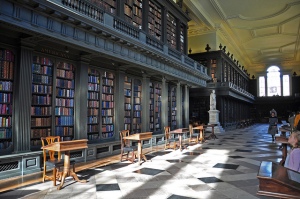
The Great Library.
9:40am – I add the new law journals to our Scandex (a sort of squashed filing-cabinet used for keeping track of standing orders/journals), stamp, and then shelve on our ‘New Journals’ display. Eventually these issues will be catalogued online, but serials cataloguing is a scary business that I leave to braver people. For the moment, I notice that some of the series from last year are now complete, so I bundle them up and put them aside ready to be sent to the binders. I add holdings records for the textbooks on Aleph (the university’s circulation and cataloguing software), create catalogue cards for them (yes, we still do this), stamp and bookplate, then shelve.
9:45am – I continue with my trainee project. This is the part of your traineeship where you’re allowed to undertake a self-contained task that will benefit the library, or conduct a bit of research into the library’s collections and history. I’ve elected to create a database of Codrington Readers up to 1900, based on signatures in the original admissions book. The library began admitting non-Fellows from the wider university in 1867, on the condition they behave nicely and sign the admissions register. Creating the database involves transcribing hundreds of signatures, of varying legibility. In many cases I have to make an educated guess, and cross-reference with the Oxford Historical Register , individual College Registers, and “other sources” (i.e. Google). My success rate is reasonable, but progress can be painfully slow. I’ve reached the early 1880s.
10am – The team take a break and admire assorted cat pictures: http://www.buzzfeed.com/expresident/best-things-about-cat-bedtime. Adorable. General agreement.
10:15am – Two new readers arrive (an historian and an archaeologist). I process their applications, make up their library cards, and give them a brief introduction to the library.
10:20am – One of the new readers requests a book from the stack (something on military history). I mooch off to fetch it.
10:25am – New reader no.3 (a geographer).
10:45am – Tea time. Someone’s eaten all the white chocolate wafers.
11:30am – Much excitement. I think I have pinned down one of the more elusive signatures from the admissions register: “R. Caldwell, Tmnevelly”. Much searching turns up a Dr. (later Bishop) Robert Caldwell, an evangelist missionary and linguist who travelled widely in Southern India (“Tmnevelly”, it seems, is the transliterated name of a settlement in the modern Indian state of Tamil Nadu).
12 noon – Lunchtime! Spicy sausage with couscous and chili jam.
12:30pm – The post has arrived. A donation from the Warden (the head of the College) concerning European Merger Law, a few invoices from EBSCO (our main journal supplier), the latest issues of three journals, and a book about Early Gunpowder Artillery. I add the invoices to our accounts spread sheet and add a holdings record for the Artillery book, pausing for a wry chuckle at the author’s picture (think Bill Bailey in a jerkin). I then process the journals (more wrestling with the Scandex), and strategically ignore the donation for the moment.
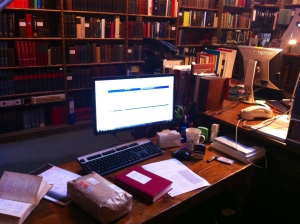
My desk, looking quite tidy.
1pm – Back to the admissions book. I’m using the 19th century registers of Lincoln’s Inn and Inner Temple in an attempt to track down a few of the more stubborn signatures.
2pm – Spend a frustrating 10 minutes attempting to locate a book in the stack, only to find it was sat in the office – 6 feet from my desk – the whole time. Grrr. Time for tea.
2:30pm – Another donation, this time from an avant-garde artist in Poznan. The book is beyond my cataloguing skills, so I pass it to my colleague Fiona. Instead, I do the easy physical processing stuff, such as the donor’s bookplate, library stamps, and pressmark. I add the title to our donations spread sheet, and write a brief acknowledgement note (discovering lots of new Polish letter-forms in Microsoft Word in the process). Eventually this note will be signed by the Fellow Librarian, and sent to the donor as a thank you.
3pm – I carry on with my cataloguing training. I’ve already been taught how to add simple holdings records for single and multipart items in Aleph , but now I’m learning to catalogue books from scratch. This involves mastering the shadowy art of the MARC record. MARC is a sort of rudimentary programming language that allows bibliographical data to be read by machines. It’s not impossibly hard, and I’m getting better with practice, but it can be rather pedantic and fiddly. There are lots of rules and procedures to remember, and it’s a real test of my concentration. Mercifully the person running the course at the Bodleian has a sense of humour, and my practice cataloguing tasks are all for ludicrous made-up books. My favourite so far is “Proceedings of the fourth California Prune Symposium”.
4pm – I have a long chat with the Assistant Librarian about her on-going attempts to construct a database of College Fellows (current and historic). Seems very complicated. More tea required.
4:30pm – More cataloguing exercises. My concentration wavers when an external researcher arrives to view a manuscript and some early printed books. The Codrington has lots of these (about a third of the entire collection of 185,000 items dates from before 1800), and I never miss an opportunity to shamelessly peer over people’s shoulders when something interesting gets called up.
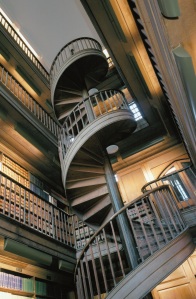
Spiral staircase in the library office (my desk is at the bottom).
5:30pm – Some re-shelving (apparently a task no trainee can avoid), re-filing of catalogue cards (most hated job), and general tidying up.
6:15pm – I lock the Fellows’ door (an entrance reserved for members of the College) and do the washing up.
6:25pm – The Assistant Librarian politely encourages our few remaining readers to begin packing up.
6:30pm – Home time!
Well, I hope that’s given you an idea of an average (ish) day as a library trainee at All Souls. The traineeship for 2013/14 is being advertised now (closing date: April 5), so if you have any questions about the job please do feel free to drop me an email, either at will.beharrell@all-souls.ox.ac.uk, or via the library’s general enquiries address: codrington.library@all-souls.ox.ac.uk. You can also find more information on the library website: http://www.all-souls.ox.ac.uk/content/The_Codrington_Library.
Read Full Post »
